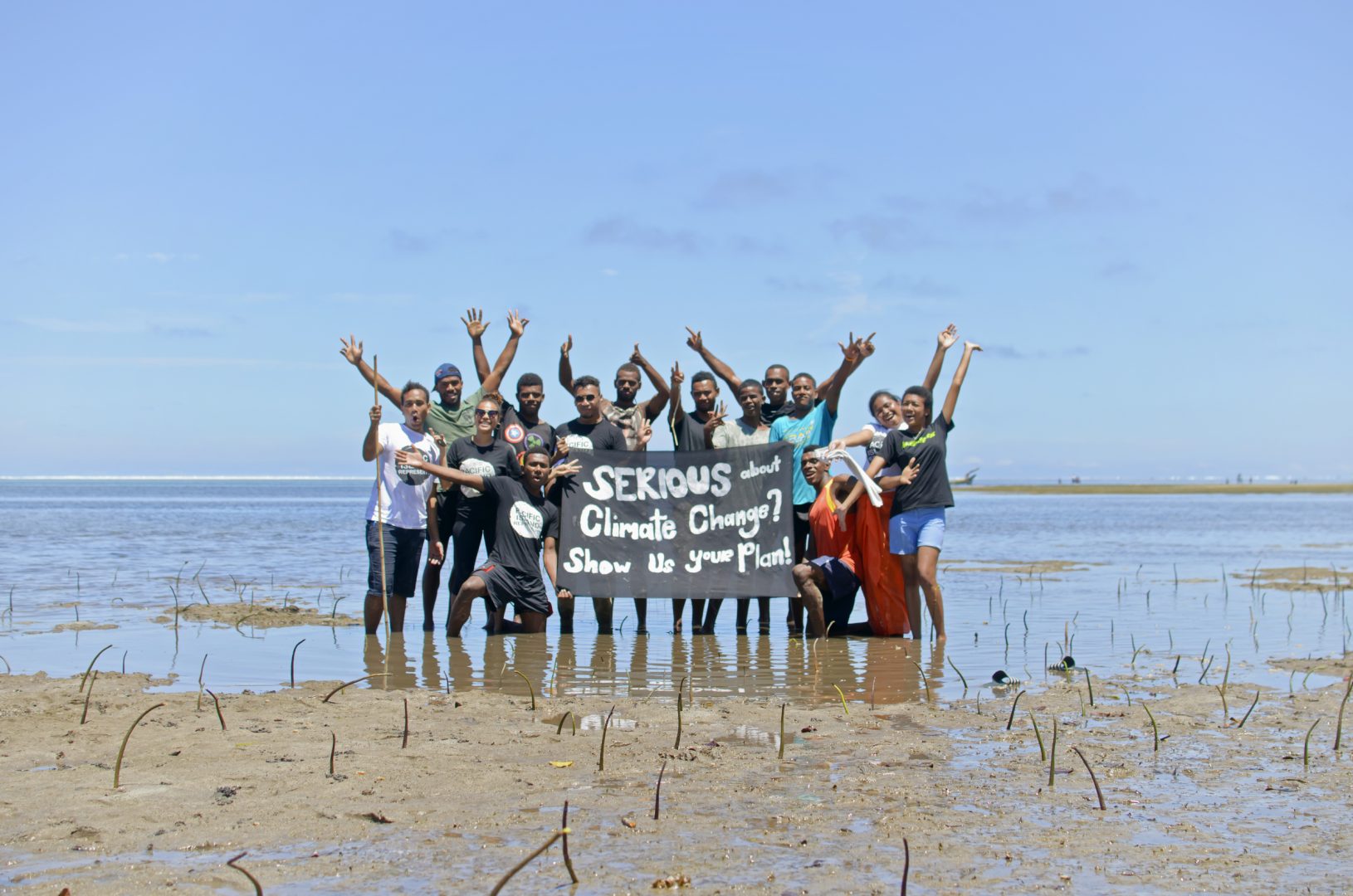Greenpeace’s Head of Pacific Auimatagi Joseph Sapati Moeono-Kolio reflects on how decisions to open new coal mines in Australia will impact on his home and people.

Greenpeace are in Tarawa to document the challenges the people of Kiribati are facing towards their livelihood and survival, from climate change and overfishing.|Boy playing on the beach at sunset in the fishing village Te O Ni Beeki in Betio, on Tarawa Island. Kiribati is considered one of the least developed and poorest countries in the world with people whose livelihoods depend on the fish. Since the arrival of foreign fishing vessels in Kiribati waters, the catches for the local fishermen have been reduced.
Greenpeace are in Tarawa to document the challenges the people of Kiribati are facing towards their livelihood and survival, from climate change and overfishing.|Pacific Island Represent! activists joined community members in Navutulevu Village on the Coral Coast to raise awareness about climate change, and plant mangroves to slow down coastal erosion.
When I was 16 years old, my father took me for a walk through our village. Falefa is one of Samoa’s older villages, and during our walk, Dad would recount stories from our village’s ancient days, as he pointed to sites of famous battles and the burial places of great figures.
As my father spoke, I started to imagine what this place looked like 50, 100, even 1000 years ago. Dad wanted to show me where he went to school and as we approached the beach, we stopped and looked out into the open ocean. There, beneath our feet, under a foot of water, lay the foundations of his former primary school.
Since that day, I have seen many other striking images of the impacts of the changing climate, through extreme weather events and the displacement of whole communities. But the experience of standing with my feet in the sea, atop the foundations of Dad’s old school, remains with me, a vivid reminder of what is now at stake for all of us in the islands, on the front lines of climate change.
For well over 30 years, the science has been clear that our collective addiction to old, dirty sources of energy such as coal and oil and the dumping of decades of greenhouse gases into the atmosphere has directly contributed to the changing climate. Yet, in 2019, we are still no closer to decisive action in many parts of the world – including Australia.
Australia’s decision to put profits over people finds expression in a Prime Minister and political system completely beholden to the whims of Coal executives. The Adani Coal Mine has just cleared the final environmental approval hurdle, and is poised to serve as an ‘icebreaker’ for up to six other mines in the Galilee Basin. This final approval is its groundwater management plan which will severely affect the quality of water for first Australians. Once again, profits over people.
The flow on effects of harnessing that much coal power will contribute significantly to the tonnes of greenhouse gases already being pumped into the atmosphere and thereby, to the demise of front line communities, already reeling from the constant barrage of extreme weather systems, sea level rise and ocean acidification exacerbated by coal, oil and gas.
Yet, Morrison has attempted to orient Australia’s foreign policy to the Pacific, describing Pacific Islanders as family. How many family members do you know would burn their family’s house down to keep their oil executive colleagues happy? It seems like Morrison’s idea of family is akin to that of the Dad paying child support to a child he doesn’t even like. In the Pacific, we have a very different idea of “family.”
Scott Morrison is an odd fellow but not a difficult one to understand. In one breath he’ll pivot towards the Pacific and sign the Boe Declaration and in the same breath, bring a lump of coal to Parliament in a declaration of love for the industry and donors who fund his campaigns.
Under Scott Morrison’s leadership, Australia signed the Boe Declaration, which recognises climate change as the number one security threat to the Pacific region. How can the Morrison Government reconcile its support for Adani with its acceptance of the climate change threat to the Pacific?
It seems as if Morrison – an evangelical Christian no less – is able to close his eyes to the realities of peoples in the Pacific, suffering from the effects of Climate Change, in order to maintain his government’s support of the industry that is the lifeblood of his political career. Not very Christ-like, is it Scott?
Once again, an unambitious, one dimensional Government has been re-elected in Australia, off the back of years of concerted misinformation campaigning and millions of dollars of coal money. To say that concerned citizens and indeed, the Pacific are somewhat dismayed would be an understatement.
We in the Pacific do not have the luxury of taking our foot off the pedal, of getting “climate fatigue”, or taking a break. For us, looking at decisions like the approval of Adani’s groundwater management plan this week and the likely opening up of the Galilee basin – what is at stake is our whole way of life.
We need to keep fighting to save our homelands from the impacts of climate change at every turn. We have no choice but to press on. To pick ourselves up. To keep campaigning, mobilizing, organizing and speaking truth to power even when power refuses to hear it. The Pacific will not go quietly into the night.
We have 11 years. This is the job.
This piece first published in the Daily Telegraph and News Limited online network here (paywalled)

